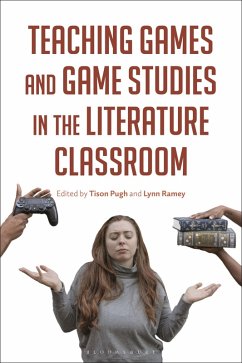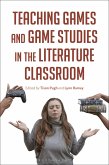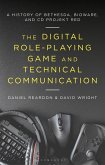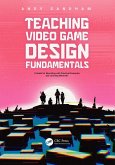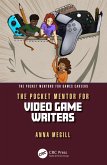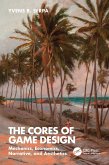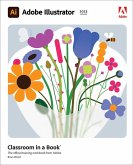Teaching Games and Game Studies in the Literature Classroom (eBook, ePUB)
Redaktion: Pugh, Tison; Ramey, Lynn
26,95 €
26,95 €
inkl. MwSt.
Sofort per Download lieferbar

13 °P sammeln
26,95 €
Als Download kaufen

26,95 €
inkl. MwSt.
Sofort per Download lieferbar

13 °P sammeln
Jetzt verschenken
Alle Infos zum eBook verschenken
26,95 €
inkl. MwSt.
Sofort per Download lieferbar
Alle Infos zum eBook verschenken

13 °P sammeln
Teaching Games and Game Studies in the Literature Classroom (eBook, ePUB)
Redaktion: Pugh, Tison; Ramey, Lynn
- Format: ePub
- Merkliste
- Auf die Merkliste
- Bewerten Bewerten
- Teilen
- Produkt teilen
- Produkterinnerung
- Produkterinnerung

Bitte loggen Sie sich zunächst in Ihr Kundenkonto ein oder registrieren Sie sich bei
bücher.de, um das eBook-Abo tolino select nutzen zu können.
Hier können Sie sich einloggen
Hier können Sie sich einloggen
Sie sind bereits eingeloggt. Klicken Sie auf 2. tolino select Abo, um fortzufahren.

Bitte loggen Sie sich zunächst in Ihr Kundenkonto ein oder registrieren Sie sich bei bücher.de, um das eBook-Abo tolino select nutzen zu können.
Teaching Games and Game Studies in the Literature Classroom offers practical suggestions for educators looking to incorporate ludic media, ranging from novels to video games and from poems to board games, into their curricula. Across the globe, video games and interactive media have already been granted their own departments at numerous larger institutions and will increasingly fall under the purview of language and literature departments at smaller schools. This volume considers fundamental ways in which literature can be construed as a game and the benefits of such an approach. The…mehr
- Geräte: eReader
- mit Kopierschutz
- eBook Hilfe
- Größe: 16.89MB
Andere Kunden interessierten sich auch für
![Teaching Games and Game Studies in the Literature Classroom (eBook, PDF) Teaching Games and Game Studies in the Literature Classroom (eBook, PDF)]() Teaching Games and Game Studies in the Literature Classroom (eBook, PDF)26,95 €
Teaching Games and Game Studies in the Literature Classroom (eBook, PDF)26,95 €![The Digital Role-Playing Game and Technical Communication (eBook, ePUB) The Digital Role-Playing Game and Technical Communication (eBook, ePUB)]() Daniel ReardonThe Digital Role-Playing Game and Technical Communication (eBook, ePUB)28,95 €
Daniel ReardonThe Digital Role-Playing Game and Technical Communication (eBook, ePUB)28,95 €![Teaching Video Game Design Fundamentals (eBook, ePUB) Teaching Video Game Design Fundamentals (eBook, ePUB)]() Andy SandhamTeaching Video Game Design Fundamentals (eBook, ePUB)51,95 €
Andy SandhamTeaching Video Game Design Fundamentals (eBook, ePUB)51,95 €![The Pocket Mentor for Video Game Writers (eBook, ePUB) The Pocket Mentor for Video Game Writers (eBook, ePUB)]() Anna MegillThe Pocket Mentor for Video Game Writers (eBook, ePUB)33,95 €
Anna MegillThe Pocket Mentor for Video Game Writers (eBook, ePUB)33,95 €![The Cores of Game Design (eBook, ePUB) The Cores of Game Design (eBook, ePUB)]() Yvens R. SerpaThe Cores of Game Design (eBook, ePUB)46,95 €
Yvens R. SerpaThe Cores of Game Design (eBook, ePUB)46,95 €![The Game Writing Guide (eBook, ePUB) The Game Writing Guide (eBook, ePUB)]() Anna MegillThe Game Writing Guide (eBook, ePUB)45,95 €
Anna MegillThe Game Writing Guide (eBook, ePUB)45,95 €![Access Code Card for Adobe Illustrator Classroom in a Book (2023 release) (eBook, ePUB) Access Code Card for Adobe Illustrator Classroom in a Book (2023 release) (eBook, ePUB)]() Brian WoodAccess Code Card for Adobe Illustrator Classroom in a Book (2023 release) (eBook, ePUB)35,95 €
Brian WoodAccess Code Card for Adobe Illustrator Classroom in a Book (2023 release) (eBook, ePUB)35,95 €-
-
-
Teaching Games and Game Studies in the Literature Classroom offers practical suggestions for educators looking to incorporate ludic media, ranging from novels to video games and from poems to board games, into their curricula. Across the globe, video games and interactive media have already been granted their own departments at numerous larger institutions and will increasingly fall under the purview of language and literature departments at smaller schools. This volume considers fundamental ways in which literature can be construed as a game and the benefits of such an approach. The contributors outline pedagogical strategies for integrating the study of video games with the study of literature and consider the intersections of identity and ideology as they relate to literature and ludology. They also address the benefits (and liabilities) of making the process of learning itself a game, an approach that is quickly gaining currency and increasing interest. Every chapter is grounded in theory but focuses on practical applications to develop students' critical thinking skills and intercultural competence through both digital and analog gameful approaches.
Produktdetails
- Produktdetails
- Verlag: Bloomsbury UK eBooks
- Seitenzahl: 256
- Erscheinungstermin: 22. September 2022
- Englisch
- ISBN-13: 9781350269736
- Artikelnr.: 64436398
- Verlag: Bloomsbury UK eBooks
- Seitenzahl: 256
- Erscheinungstermin: 22. September 2022
- Englisch
- ISBN-13: 9781350269736
- Artikelnr.: 64436398
- Herstellerkennzeichnung Die Herstellerinformationen sind derzeit nicht verfügbar.
Tison Pugh is Pegasus Professor of English at the University of Central Florida, USA. Lynn Ramey is Professor of French and Director of the Center for Digital Humanities at Vanderbilt University, USA.
List of Figures
Introduction: Ludology and Narratology in the Literature Classroom, Tison
Pugh (University of Central Florida, USA) and Lynn Ramey (Vanderbilt
University, USA)
Part I: Theories of the Ludic and Literary Classroom
1. Developing and Teaching Games-Focused English Courses: A Technological
and Curricular Walkthrough, Eric Detweiler (Middle Tennessee State
University, USA)
2. Gaming Literature: Games as an Accessible Entry into the Study of
Literature, Regina Mills (Texas A&M University, USA)
3. Levelling Up: Transferring the Analytical Gaze from Print Literature to
Digital Literature and Digital Games in the Literature Classroom, Nolan
Bazinet (University of Sherbrooke, Canada)
4. Reverse-Engineering Stories in the Literature Classroom: Linking Video
Games and Traditional Narratives to Foster Critical Reading Skills, John
Misak (New York Institute of Technology, USA)
5. Pwning Tolkien's Trilogy: Game Studies in a Massively Open Online Course
(MOOC), Jay Clayton (Vanderbilt University, USA) and Don Rodrigues
(University of Memphis, USA)
6. How/Why We Read/Play: Conceptualizing Reader Goals in the Game of
Literature, Mitchell Gunn (University of Toronto, Canada)
Part II: Videogames and Interactive Media in the Literature Classroom
7. Ready Player Action: Teaching Close Reading and Critical Play in a Ludic
Century, Craig Carey (University of Southern Mississippi, USA)
8. Teaching Japanese Video Games: Practical Strategies for Analysis and
Assessment, Ben Whaley (University of Calgary, Canada)
9. Intervening in Game Cultures: Video Game Streams and/as Literature,
Cody Mejeur (University at Buffalo, USA)
10. Ethical Simulation Games in the Liberal Arts Classroom: Civilization V
, SimEarth, and Sweatshop, Harry Brown and Nicole Lobdell (De Pauw
University, USA)
11. Thinking Outside the Book: Procedural Bibliography as Textual Pedagogy
for Literary Video Games, Chloe Anna Milligan (Pennsylvania State
University, USA)
Part III: Gaming Identity and Ideology in the Literature Classroom
12. Teaching the Iñupiaq Video Game Never Alone and/as Literature, Natalie
Neill (York University, Canada)
13. First Person in Translation: Gaming Perspectives on Indigenous
Languages and Literature, Jillian Sayre (Rutgers University, USA)
14. Playing in the Dark: Teaching Representation, Appropriation, and
Identification with Assassin's Creed III, James K. Harris (Bronx Community
College, USA)
15. Constructing Subjectivities and Teaching Otherness through the Silent
Hill Series, Katsuya Izumi (University at Albany, USA)
Part IV: Gamifying the Literature Classroom
16. Film and Literature Instruction through Live-Action Role-Play, Evan
Torner (University of Cincinnati, USA)
17. How to Develop Gamified Pedagogical Strategies: A Case Study of
Classical Japanese Poetry in the Undergraduate Classroom, Catherine Ryu
(Michigan State University, USA)
18. Designing and Implementing a Roleplaying-Game-Based Course in Advanced
Classical Literature: Challenges, Benefits, and Iterations, Roger Travis
(University of Connecticut, USA)
19. Games We Play on Paper: Understanding the Process of Discovery through
Detective Fiction and Behavioral Neuroscience, Michelle Robinson
(University of North Carolina at Chapel Hill, USA) and Marsha Penner
(University of North Carolina at Chapel Hill, USA)
20. Making Feminist Games in the Gender Studies and Literature Classroom,
Gabi Kirilloff (Texas Christian University, USA)
Afterword: Confessions of a Game Scholar in an English Department,
Anastasia Salter (University of Central Florida, USA)
Resources
Notes on Contributors
Selected Bibliography
Index
Introduction: Ludology and Narratology in the Literature Classroom, Tison
Pugh (University of Central Florida, USA) and Lynn Ramey (Vanderbilt
University, USA)
Part I: Theories of the Ludic and Literary Classroom
1. Developing and Teaching Games-Focused English Courses: A Technological
and Curricular Walkthrough, Eric Detweiler (Middle Tennessee State
University, USA)
2. Gaming Literature: Games as an Accessible Entry into the Study of
Literature, Regina Mills (Texas A&M University, USA)
3. Levelling Up: Transferring the Analytical Gaze from Print Literature to
Digital Literature and Digital Games in the Literature Classroom, Nolan
Bazinet (University of Sherbrooke, Canada)
4. Reverse-Engineering Stories in the Literature Classroom: Linking Video
Games and Traditional Narratives to Foster Critical Reading Skills, John
Misak (New York Institute of Technology, USA)
5. Pwning Tolkien's Trilogy: Game Studies in a Massively Open Online Course
(MOOC), Jay Clayton (Vanderbilt University, USA) and Don Rodrigues
(University of Memphis, USA)
6. How/Why We Read/Play: Conceptualizing Reader Goals in the Game of
Literature, Mitchell Gunn (University of Toronto, Canada)
Part II: Videogames and Interactive Media in the Literature Classroom
7. Ready Player Action: Teaching Close Reading and Critical Play in a Ludic
Century, Craig Carey (University of Southern Mississippi, USA)
8. Teaching Japanese Video Games: Practical Strategies for Analysis and
Assessment, Ben Whaley (University of Calgary, Canada)
9. Intervening in Game Cultures: Video Game Streams and/as Literature,
Cody Mejeur (University at Buffalo, USA)
10. Ethical Simulation Games in the Liberal Arts Classroom: Civilization V
, SimEarth, and Sweatshop, Harry Brown and Nicole Lobdell (De Pauw
University, USA)
11. Thinking Outside the Book: Procedural Bibliography as Textual Pedagogy
for Literary Video Games, Chloe Anna Milligan (Pennsylvania State
University, USA)
Part III: Gaming Identity and Ideology in the Literature Classroom
12. Teaching the Iñupiaq Video Game Never Alone and/as Literature, Natalie
Neill (York University, Canada)
13. First Person in Translation: Gaming Perspectives on Indigenous
Languages and Literature, Jillian Sayre (Rutgers University, USA)
14. Playing in the Dark: Teaching Representation, Appropriation, and
Identification with Assassin's Creed III, James K. Harris (Bronx Community
College, USA)
15. Constructing Subjectivities and Teaching Otherness through the Silent
Hill Series, Katsuya Izumi (University at Albany, USA)
Part IV: Gamifying the Literature Classroom
16. Film and Literature Instruction through Live-Action Role-Play, Evan
Torner (University of Cincinnati, USA)
17. How to Develop Gamified Pedagogical Strategies: A Case Study of
Classical Japanese Poetry in the Undergraduate Classroom, Catherine Ryu
(Michigan State University, USA)
18. Designing and Implementing a Roleplaying-Game-Based Course in Advanced
Classical Literature: Challenges, Benefits, and Iterations, Roger Travis
(University of Connecticut, USA)
19. Games We Play on Paper: Understanding the Process of Discovery through
Detective Fiction and Behavioral Neuroscience, Michelle Robinson
(University of North Carolina at Chapel Hill, USA) and Marsha Penner
(University of North Carolina at Chapel Hill, USA)
20. Making Feminist Games in the Gender Studies and Literature Classroom,
Gabi Kirilloff (Texas Christian University, USA)
Afterword: Confessions of a Game Scholar in an English Department,
Anastasia Salter (University of Central Florida, USA)
Resources
Notes on Contributors
Selected Bibliography
Index
List of Figures
Introduction: Ludology and Narratology in the Literature Classroom, Tison
Pugh (University of Central Florida, USA) and Lynn Ramey (Vanderbilt
University, USA)
Part I: Theories of the Ludic and Literary Classroom
1. Developing and Teaching Games-Focused English Courses: A Technological
and Curricular Walkthrough, Eric Detweiler (Middle Tennessee State
University, USA)
2. Gaming Literature: Games as an Accessible Entry into the Study of
Literature, Regina Mills (Texas A&M University, USA)
3. Levelling Up: Transferring the Analytical Gaze from Print Literature to
Digital Literature and Digital Games in the Literature Classroom, Nolan
Bazinet (University of Sherbrooke, Canada)
4. Reverse-Engineering Stories in the Literature Classroom: Linking Video
Games and Traditional Narratives to Foster Critical Reading Skills, John
Misak (New York Institute of Technology, USA)
5. Pwning Tolkien's Trilogy: Game Studies in a Massively Open Online Course
(MOOC), Jay Clayton (Vanderbilt University, USA) and Don Rodrigues
(University of Memphis, USA)
6. How/Why We Read/Play: Conceptualizing Reader Goals in the Game of
Literature, Mitchell Gunn (University of Toronto, Canada)
Part II: Videogames and Interactive Media in the Literature Classroom
7. Ready Player Action: Teaching Close Reading and Critical Play in a Ludic
Century, Craig Carey (University of Southern Mississippi, USA)
8. Teaching Japanese Video Games: Practical Strategies for Analysis and
Assessment, Ben Whaley (University of Calgary, Canada)
9. Intervening in Game Cultures: Video Game Streams and/as Literature,
Cody Mejeur (University at Buffalo, USA)
10. Ethical Simulation Games in the Liberal Arts Classroom: Civilization V
, SimEarth, and Sweatshop, Harry Brown and Nicole Lobdell (De Pauw
University, USA)
11. Thinking Outside the Book: Procedural Bibliography as Textual Pedagogy
for Literary Video Games, Chloe Anna Milligan (Pennsylvania State
University, USA)
Part III: Gaming Identity and Ideology in the Literature Classroom
12. Teaching the Iñupiaq Video Game Never Alone and/as Literature, Natalie
Neill (York University, Canada)
13. First Person in Translation: Gaming Perspectives on Indigenous
Languages and Literature, Jillian Sayre (Rutgers University, USA)
14. Playing in the Dark: Teaching Representation, Appropriation, and
Identification with Assassin's Creed III, James K. Harris (Bronx Community
College, USA)
15. Constructing Subjectivities and Teaching Otherness through the Silent
Hill Series, Katsuya Izumi (University at Albany, USA)
Part IV: Gamifying the Literature Classroom
16. Film and Literature Instruction through Live-Action Role-Play, Evan
Torner (University of Cincinnati, USA)
17. How to Develop Gamified Pedagogical Strategies: A Case Study of
Classical Japanese Poetry in the Undergraduate Classroom, Catherine Ryu
(Michigan State University, USA)
18. Designing and Implementing a Roleplaying-Game-Based Course in Advanced
Classical Literature: Challenges, Benefits, and Iterations, Roger Travis
(University of Connecticut, USA)
19. Games We Play on Paper: Understanding the Process of Discovery through
Detective Fiction and Behavioral Neuroscience, Michelle Robinson
(University of North Carolina at Chapel Hill, USA) and Marsha Penner
(University of North Carolina at Chapel Hill, USA)
20. Making Feminist Games in the Gender Studies and Literature Classroom,
Gabi Kirilloff (Texas Christian University, USA)
Afterword: Confessions of a Game Scholar in an English Department,
Anastasia Salter (University of Central Florida, USA)
Resources
Notes on Contributors
Selected Bibliography
Index
Introduction: Ludology and Narratology in the Literature Classroom, Tison
Pugh (University of Central Florida, USA) and Lynn Ramey (Vanderbilt
University, USA)
Part I: Theories of the Ludic and Literary Classroom
1. Developing and Teaching Games-Focused English Courses: A Technological
and Curricular Walkthrough, Eric Detweiler (Middle Tennessee State
University, USA)
2. Gaming Literature: Games as an Accessible Entry into the Study of
Literature, Regina Mills (Texas A&M University, USA)
3. Levelling Up: Transferring the Analytical Gaze from Print Literature to
Digital Literature and Digital Games in the Literature Classroom, Nolan
Bazinet (University of Sherbrooke, Canada)
4. Reverse-Engineering Stories in the Literature Classroom: Linking Video
Games and Traditional Narratives to Foster Critical Reading Skills, John
Misak (New York Institute of Technology, USA)
5. Pwning Tolkien's Trilogy: Game Studies in a Massively Open Online Course
(MOOC), Jay Clayton (Vanderbilt University, USA) and Don Rodrigues
(University of Memphis, USA)
6. How/Why We Read/Play: Conceptualizing Reader Goals in the Game of
Literature, Mitchell Gunn (University of Toronto, Canada)
Part II: Videogames and Interactive Media in the Literature Classroom
7. Ready Player Action: Teaching Close Reading and Critical Play in a Ludic
Century, Craig Carey (University of Southern Mississippi, USA)
8. Teaching Japanese Video Games: Practical Strategies for Analysis and
Assessment, Ben Whaley (University of Calgary, Canada)
9. Intervening in Game Cultures: Video Game Streams and/as Literature,
Cody Mejeur (University at Buffalo, USA)
10. Ethical Simulation Games in the Liberal Arts Classroom: Civilization V
, SimEarth, and Sweatshop, Harry Brown and Nicole Lobdell (De Pauw
University, USA)
11. Thinking Outside the Book: Procedural Bibliography as Textual Pedagogy
for Literary Video Games, Chloe Anna Milligan (Pennsylvania State
University, USA)
Part III: Gaming Identity and Ideology in the Literature Classroom
12. Teaching the Iñupiaq Video Game Never Alone and/as Literature, Natalie
Neill (York University, Canada)
13. First Person in Translation: Gaming Perspectives on Indigenous
Languages and Literature, Jillian Sayre (Rutgers University, USA)
14. Playing in the Dark: Teaching Representation, Appropriation, and
Identification with Assassin's Creed III, James K. Harris (Bronx Community
College, USA)
15. Constructing Subjectivities and Teaching Otherness through the Silent
Hill Series, Katsuya Izumi (University at Albany, USA)
Part IV: Gamifying the Literature Classroom
16. Film and Literature Instruction through Live-Action Role-Play, Evan
Torner (University of Cincinnati, USA)
17. How to Develop Gamified Pedagogical Strategies: A Case Study of
Classical Japanese Poetry in the Undergraduate Classroom, Catherine Ryu
(Michigan State University, USA)
18. Designing and Implementing a Roleplaying-Game-Based Course in Advanced
Classical Literature: Challenges, Benefits, and Iterations, Roger Travis
(University of Connecticut, USA)
19. Games We Play on Paper: Understanding the Process of Discovery through
Detective Fiction and Behavioral Neuroscience, Michelle Robinson
(University of North Carolina at Chapel Hill, USA) and Marsha Penner
(University of North Carolina at Chapel Hill, USA)
20. Making Feminist Games in the Gender Studies and Literature Classroom,
Gabi Kirilloff (Texas Christian University, USA)
Afterword: Confessions of a Game Scholar in an English Department,
Anastasia Salter (University of Central Florida, USA)
Resources
Notes on Contributors
Selected Bibliography
Index
